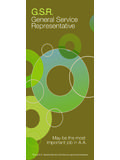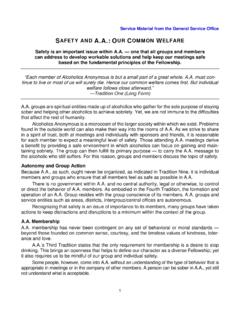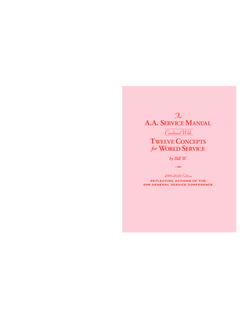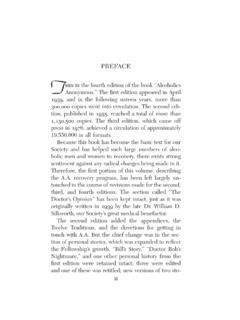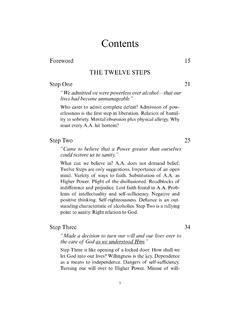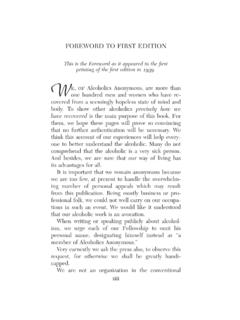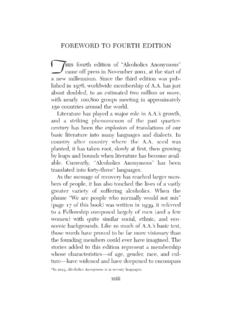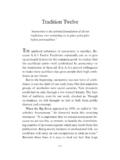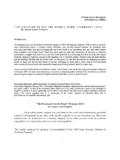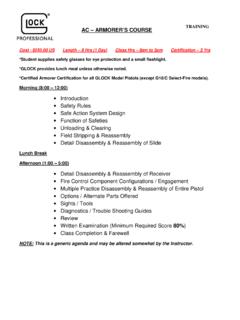Transcription of Chapter 3 - More About Alcoholism - (pp. 30-43)
1 Chapter 3 more About Alcoholism Most of ushave been unwilling to admit wewere real alcoholics. No person likes to thinkhe is bodily and mentally different from his , it is not surprising that our drinking careershave been characterized by countless vain attemptsto prove we could drink like other people. The ideathat somehow, someday he will control and enjoy hisdrinking is the great obsession of every abnormaldrinker. The persistence of this illusion is pursue it into the gates of insanity or learned that we had to fully concede to our in-nermost selves that we were alcoholics. This is thefirst step in recovery. The delusion that we are likeother people, or presently may be, has to be alcoholics are men and women who have lostthe ability to control our drinking.
2 We know that noreal alcoholic everrecovers control. All of us felt attimes that we were regaining control, but such inter-vals usually brief were inevitably followed by stillless control, which led in time to pitiful and incompre-hensible demoralization. We are convinced to a manthat alcoholics of our type are in the grip of a progres-sive illness. Over any considerable period we getworse, never men who have lost their legs; theynever grow new ones. Neither does there appear to beany kind of treatment which will make alcoholics of30our kind like other men. We have tried every imagina-ble remedy. In some instances there has been briefrecovery, followed always by a still worse who are familiar with Alcoholism agreethere is no such thing as making a normal drinker outof an alcoholic.
3 Science may one day accomplish this,but it hasn t done so all we can say, many who are real alcoholicsare not going to believe they are in that class. Byevery form of self-deception and experimentation, theywill try to prove themselves exceptions to the rule,therefore nonalcoholic. If anyone who is showinginability to control his drinking can do the right- About -face and drink like a gentleman, our hats areoff to him. Heaven knows, we have tried hard enoughand long enough to drink like other people!Here are some of the methods we have tried: Drink-ing beer only, limiting the number of drinks, neverdrinking alone, never drinking in the morning, drink-ing only at home, never having it in the house, neverdrinking during business hours, drinking only atparties, switching from scotch to brandy, drinkingonly natural wines, agreeing to resign if ever drunk onthe job, taking a trip, not taking a trip, swearing offforever (with and without a solemn oath)
4 , taking morephysical exercise, reading inspirational books, goingtohealth farms and sanitariums, accepting voluntarycommitment to asylums we could increase the listad do not like to pronounce any individual as alco-holic, but you can quickly diagnose yourself. Stepover to the nearest barroom and try some controlleddrinking. Try to drink and stop abruptly. Try itMORE About ALCOHOLISM31more than once. It will not take long for you to de-cide, if you are honest with yourself About it. It maybe worth a bad case of jitters if you get a full knowl-edge of your there is no way of proving it, we believethat early in our drinking careers most of us couldhave stopped drinking.
5 But the difficulty is that fewalcoholics have enough desire to stop while there isyet time. We have heard of a few instances wherepeople, who showed definite signs of Alcoholism , wereable to stop for a long period because of an overpow-ering desire to do so. Here is of thirty was doing a great deal of spreedrinking. He was very nervous in the morning afterthese bouts and quieted himself with more liquor. Hewas ambitious to succeed in business, but saw that hewould get nowhere if he drank at all. Once he started,he had no control whatever. He made up his mindthat until he had been successful in business and hadretired, he would not touch another drop.
6 An excep-tional man, he remained bone dry for twenty-fiveyears and retired at the age of fifty-five, after a suc-cessful and happy business career. Then he fell vic-tim to a belief which practically every alcoholic has that his long period of sobriety and self-disciplinehad qualified him to drink as other men. Out came hiscarpet slippers and a bottle. In two months he wasinahospital, puzzled and humiliated. He tried toregulate his drinking for a while, making several tripstothe hospital meantime. Then, gathering all hisforces, he attempted to stop altogether and found hecould not. Every means of solving his problem which 32 ALCOHOLICS ANONYMOUS money could buy was at his disposal.
7 Every attemptfailed. Though a robust man at retirement, he wentto pieces quickly and was dead within four case contains a powerful lesson. Most of ushave believed that if we remained sober for a longstretch, we could thereafter drink normally. But hereis a man who at fifty-five years found he was justwhere he had left off at thirty. We have seen the truthdemonstrated again and again: Once an alcoholic, al-ways an alcoholic. Commencing to drink after aperiod of sobriety, we are in a short time as bad asever. If we are planning to stop drinking, there mustbe no reservation of any kind, nor any lurking notionthat someday we will be immune to people may be encouraged by this man s ex-perience to think that they can stop, as he did, ontheir own will power.
8 We doubt if many of them cando it, because none will really want to stop, and hardlyone of them, because of the peculiar mental twist al-ready acquired, will find he can win out. Several ofour crowd, men of thirty or less, had been drinkingonly a few years, but they found themselves as help-less as those who had been drinking twenty be gravely affected, one does not necessarilyhave to drink a long time nor take the quantitiessome of us have. This is particularly true of female alcoholics often turninto the realthing and aregone beyond recall in a few drinkers, who would be greatly insulted ifcalled alcoholics, are astonished at their inability tostop.
9 We, who are familiar with the symptoms, seelarge numbers of potential alcoholics among youngMORE About ALCOHOLISM33people everywhere. But try and get them to see it!*As we look back, we feel we had gone on drinkingmany years beyond the point where we could quit onour will power. If anyone questions whether he hasentered this dangerous area, let him try leaving liquoralone for one year. If he is a real alcoholic and veryfar advanced, there is scant chance of success. In theearly days of our drinking we occasionally remainedsober for a year or more , becoming serious drinkersagain later. Though you may be able to stop for a con-siderable period, you may yet be a potential think few, to whom this book will appeal, can staydry anything like a year.
10 Some will be drunk the dayafter making their resolutions; most of them within afew those who are unable to drink moderately thequestion is how to stop altogether. We are assuming,of course, that the reader desires to stop. Whethersuch a person can quit upon a nonspiritual basis de-pends upon the extent to which he has already lostthe power to choose whether he will drink or of us felt that we had plenty of character. Therewas a tremendous urge to cease forever. Yet we foundit impossible. This is the baffling feature of alcoholismas we know it this utter inability to leave it alone,no matter how great the necessity or the then shall we help our readers determine, totheir own satisfaction, whether they are one of us?
